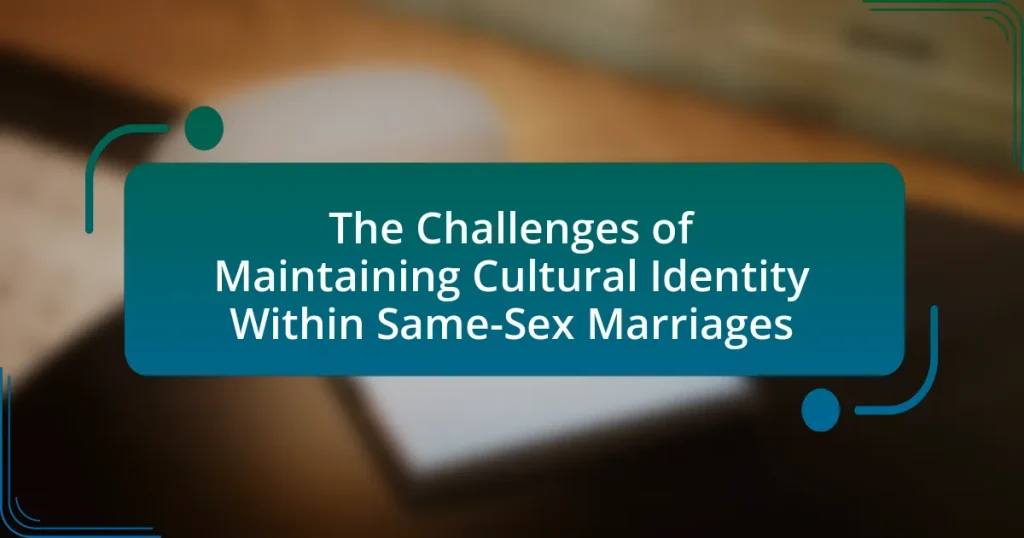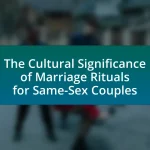The article examines the challenges of maintaining cultural identity within same-sex marriages, highlighting key issues such as societal stigma, family acceptance, and the intersection of cultural and sexual identities. It discusses how cultural backgrounds influence same-sex marriages, the impact of family expectations, and the role of societal acceptance in shaping cultural identity. Additionally, the article explores strategies that same-sex couples use to navigate these challenges, including community engagement and effective communication, while also addressing the implications of legal recognition and the importance of support networks. Overall, it provides a comprehensive overview of the complexities faced by same-sex couples in preserving their cultural identities amidst societal pressures.
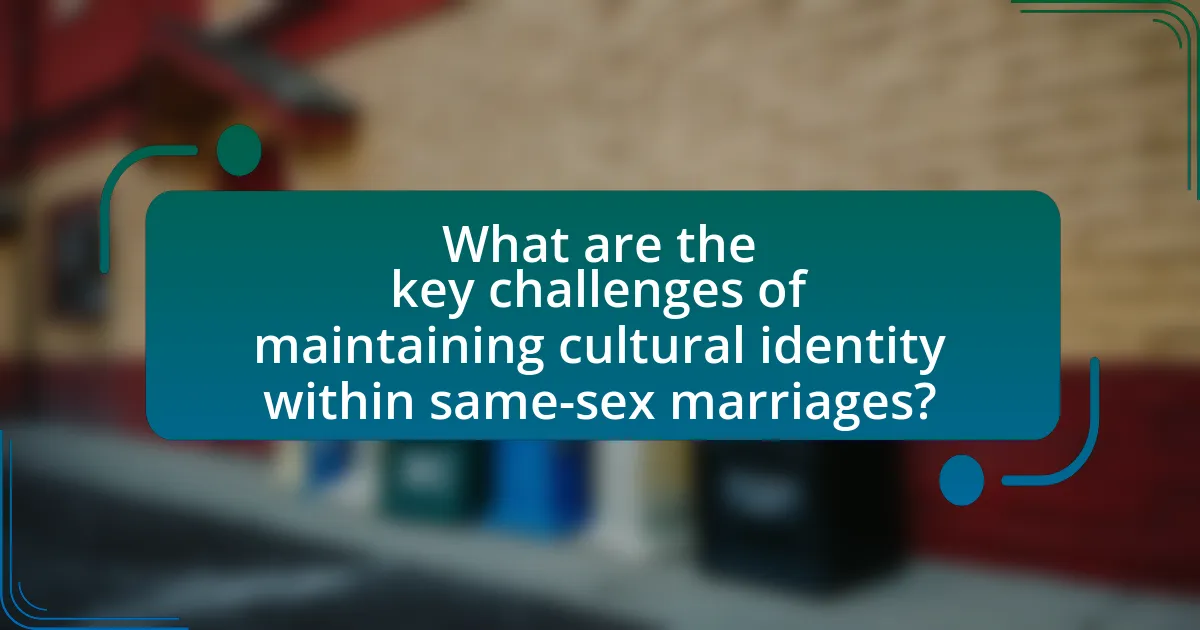
What are the key challenges of maintaining cultural identity within same-sex marriages?
The key challenges of maintaining cultural identity within same-sex marriages include societal stigma, family acceptance, and the intersection of cultural and sexual identities. Societal stigma can lead to discrimination and marginalization, making it difficult for same-sex couples to express their cultural practices openly. Family acceptance varies widely across cultures, and lack of support can create emotional strain and conflict, hindering the couple’s ability to celebrate their cultural heritage together. Additionally, navigating the complexities of cultural identity alongside sexual identity can lead to feelings of alienation or pressure to conform to either cultural or LGBTQ+ norms, complicating the couple’s sense of belonging in both communities.
How do cultural backgrounds influence same-sex marriages?
Cultural backgrounds significantly influence same-sex marriages by shaping societal acceptance, legal recognition, and familial support. For instance, in cultures with strong traditional values, such as many Middle Eastern and African societies, same-sex relationships may face severe stigma and legal repercussions, which can lead to social isolation for couples. Conversely, in more progressive cultures, like those in Western Europe and North America, same-sex marriages are often legally recognized and socially accepted, allowing couples to celebrate their identities openly. Research by the Williams Institute indicates that acceptance of same-sex marriage varies widely across different cultural contexts, impacting the experiences and challenges faced by couples in maintaining their cultural identity while navigating their relationships.
What specific cultural values are often challenged in same-sex marriages?
Same-sex marriages often challenge traditional cultural values related to heteronormativity, gender roles, and family structures. Heteronormativity, the belief that heterosexual relationships are the norm, is directly confronted by the existence of same-sex unions, which can lead to societal pushback. Additionally, established gender roles that dictate specific behaviors and responsibilities for men and women are questioned, as same-sex couples may not conform to these expectations. Furthermore, the traditional concept of family, often defined as a heterosexual couple with children, is redefined, prompting discussions about inclusivity and acceptance within various cultural contexts. These challenges reflect broader societal shifts towards recognizing diverse relationship forms and the need for cultural adaptation.
How do family expectations impact cultural identity in same-sex marriages?
Family expectations significantly influence cultural identity in same-sex marriages by imposing traditional norms and values that may conflict with the partners’ identities. These expectations can lead to pressure to conform to heteronormative standards, which may result in internal conflict and stress for individuals trying to reconcile their sexual orientation with familial and cultural obligations. Research indicates that individuals in same-sex marriages often navigate complex dynamics where familial acceptance or rejection can shape their self-perception and cultural affiliations. For instance, a study published in the Journal of Marriage and Family highlights that LGBTQ+ individuals frequently experience a sense of loss regarding their cultural identity when family expectations are not aligned with their sexual orientation, leading to feelings of isolation and disconnection from both family and cultural heritage.
What role does societal acceptance play in cultural identity for same-sex couples?
Societal acceptance significantly influences the cultural identity of same-sex couples by validating their relationships and fostering a sense of belonging. When society recognizes and accepts same-sex partnerships, it allows individuals to express their identities openly without fear of discrimination, which is crucial for their cultural integration. Research indicates that in environments where same-sex relationships are accepted, couples report higher levels of relationship satisfaction and personal well-being, as seen in studies conducted by the Williams Institute, which found that societal acceptance correlates with lower rates of mental health issues among LGBTQ+ individuals. Thus, societal acceptance not only shapes the cultural identity of same-sex couples but also enhances their overall quality of life.
How does societal stigma affect the cultural practices of same-sex couples?
Societal stigma significantly impacts the cultural practices of same-sex couples by forcing them to navigate their identities in a context of discrimination and marginalization. This stigma often leads to the alteration or suppression of cultural expressions, such as traditional ceremonies or community participation, as couples may fear backlash or exclusion from their communities. Research indicates that same-sex couples frequently adapt their cultural practices to avoid negative societal perceptions, which can dilute their cultural identity and heritage. For instance, a study published in the Journal of Homosexuality highlights that many same-sex couples modify wedding rituals to align with societal expectations, thereby compromising their authentic cultural expressions.
What are the implications of legal recognition on cultural identity in same-sex marriages?
Legal recognition of same-sex marriages significantly impacts cultural identity by validating and legitimizing diverse sexual orientations within societal frameworks. This recognition fosters greater acceptance and visibility of LGBTQ+ individuals, allowing them to express their identities more openly and authentically. For instance, studies have shown that legal recognition can lead to increased social acceptance, as seen in countries like Canada and the Netherlands, where same-sex marriage has contributed to a shift in public attitudes towards LGBTQ+ rights. Furthermore, legal recognition often encourages the integration of same-sex couples into cultural traditions and practices, thereby enriching the cultural landscape and promoting inclusivity.
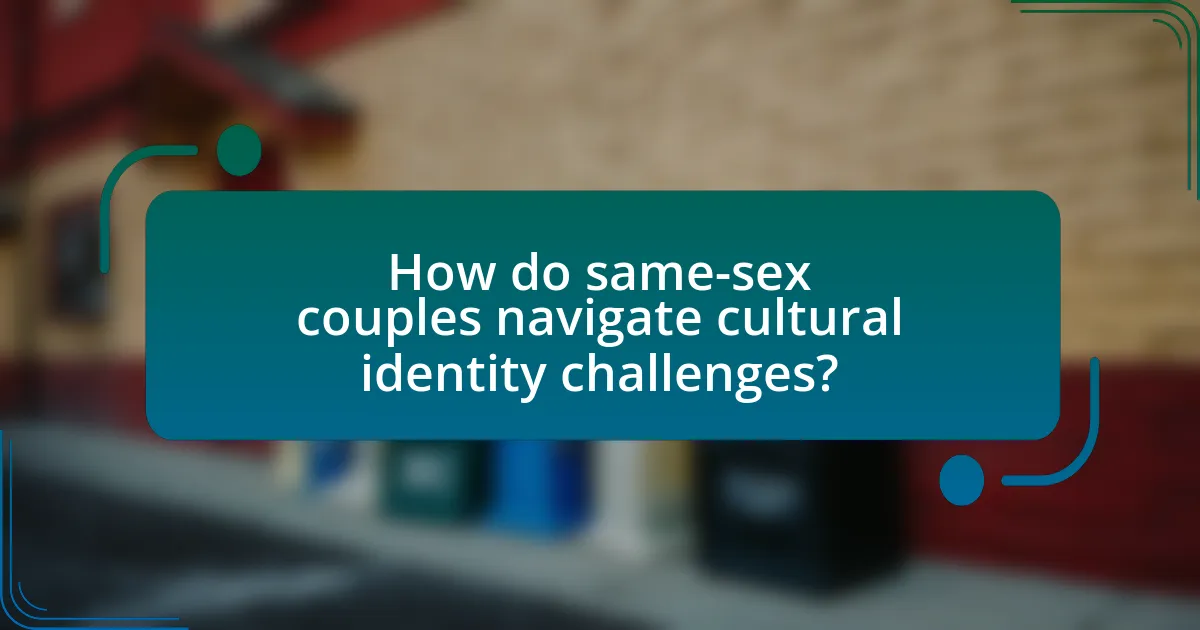
How do same-sex couples navigate cultural identity challenges?
Same-sex couples navigate cultural identity challenges by actively engaging in open communication and seeking support from both LGBTQ+ and cultural communities. This approach allows them to reconcile their sexual orientation with cultural expectations, fostering a sense of belonging. Research indicates that couples often participate in cultural events and rituals while also creating their own traditions that reflect their identities, thus bridging the gap between their cultural heritage and their sexual orientation. For instance, a study published in the Journal of Marriage and Family highlights that same-sex couples who integrate cultural practices into their relationship report higher satisfaction and a stronger sense of identity.
What strategies do same-sex couples use to preserve their cultural identity?
Same-sex couples preserve their cultural identity through community engagement, cultural rituals, and advocacy for LGBTQ+ rights. By actively participating in LGBTQ+ organizations and events, couples strengthen their ties to their cultural heritage and foster a sense of belonging. Engaging in cultural rituals, such as celebrating Pride events or participating in traditional ceremonies, allows them to honor their backgrounds while affirming their identities. Furthermore, advocacy efforts contribute to the visibility and acceptance of their cultural narratives, reinforcing their identity within broader societal contexts. Research indicates that such strategies enhance resilience and community cohesion among same-sex couples, thereby supporting their cultural identity amidst challenges.
How can couples create inclusive cultural practices within their relationship?
Couples can create inclusive cultural practices within their relationship by actively engaging in each other’s cultural traditions and values. This involves open communication about cultural backgrounds, celebrating significant cultural events together, and integrating diverse cultural practices into daily life. Research indicates that couples who share and respect each other’s cultural identities report higher relationship satisfaction and emotional connection. For instance, a study published in the Journal of Marriage and Family found that couples who participate in each other’s cultural rituals experience enhanced relationship quality and mutual understanding.
What role does community support play in maintaining cultural identity?
Community support is crucial in maintaining cultural identity, particularly within same-sex marriages, as it provides a sense of belonging and validation. This support fosters an environment where individuals can express their cultural heritage without fear of discrimination, reinforcing their identity. Research indicates that strong community ties can enhance resilience against societal pressures, allowing individuals to navigate challenges related to cultural identity more effectively. For instance, studies show that LGBTQ+ individuals who engage with supportive communities report higher levels of self-acceptance and cultural pride, which are essential for sustaining their cultural identity amidst external challenges.
How do same-sex couples balance cultural identity with relationship dynamics?
Same-sex couples balance cultural identity with relationship dynamics by actively negotiating their cultural backgrounds and relationship expectations. This negotiation often involves open communication about cultural values, traditions, and the impact of societal norms on their relationship. Research indicates that many same-sex couples draw on their cultural heritage to strengthen their bond, while also adapting to the dynamics of their partnership. For instance, a study published in the Journal of Marriage and Family highlights that couples who engage in discussions about their cultural identities report higher relationship satisfaction and resilience against external pressures. This demonstrates that the integration of cultural identity into relationship dynamics is crucial for the stability and fulfillment of same-sex partnerships.
What are the common conflicts that arise from differing cultural identities?
Common conflicts that arise from differing cultural identities include misunderstandings, discrimination, and value clashes. These conflicts often manifest in interpersonal relationships, particularly in contexts like same-sex marriages, where partners may come from diverse cultural backgrounds with differing beliefs about gender roles, family structures, and sexual orientation. For instance, research indicates that individuals from collectivist cultures may prioritize family approval over personal happiness, leading to tension when a same-sex marriage is involved. Additionally, cultural stereotypes can lead to discrimination, affecting the couple’s social acceptance and support systems. These dynamics highlight the complexities and challenges faced by individuals navigating their cultural identities within the framework of same-sex marriages.
How can effective communication help in resolving cultural identity issues?
Effective communication can help resolve cultural identity issues by fostering understanding and empathy among individuals from diverse backgrounds. When individuals engage in open dialogue, they can share their experiences and perspectives, which promotes mutual respect and reduces misunderstandings. Research indicates that effective communication strategies, such as active listening and expressing feelings clearly, can lead to more harmonious relationships, particularly in contexts like same-sex marriages where cultural identity may be challenged. For instance, a study published in the Journal of Marriage and Family found that couples who practiced effective communication reported higher relationship satisfaction and better conflict resolution, highlighting the importance of communication in navigating cultural complexities.
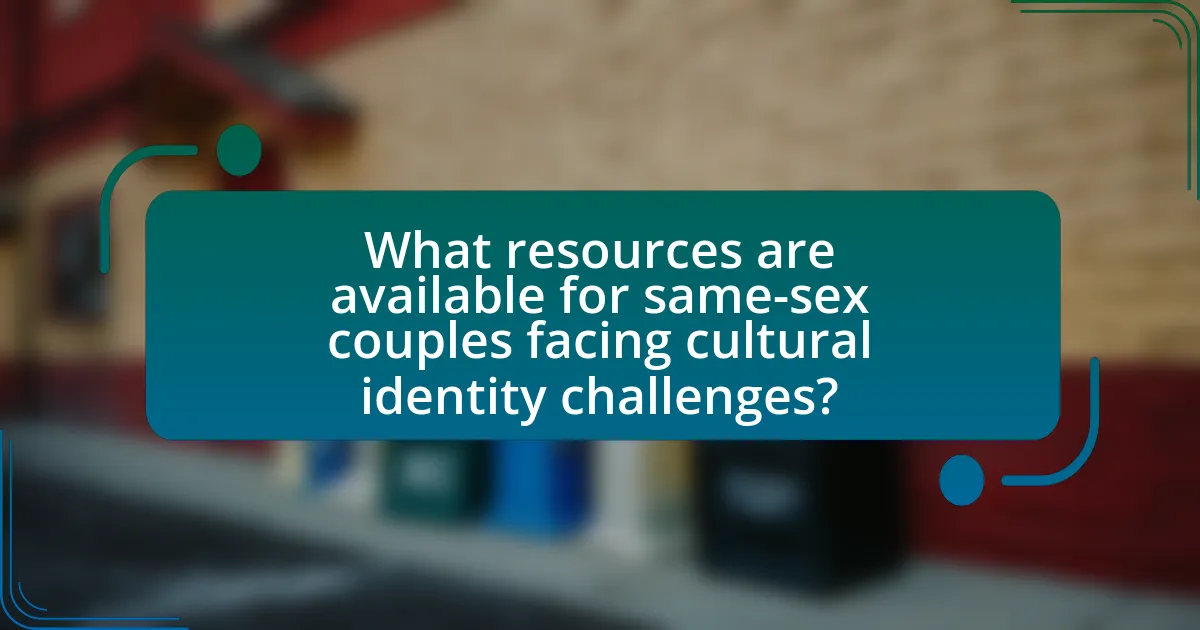
What resources are available for same-sex couples facing cultural identity challenges?
Same-sex couples facing cultural identity challenges can access various resources, including counseling services, support groups, and educational materials. Counseling services, such as those provided by the American Psychological Association, offer specialized support for LGBTQ+ individuals, helping them navigate cultural identity issues. Support groups, like those organized by PFLAG, provide a community for sharing experiences and strategies for coping with cultural pressures. Additionally, educational materials from organizations like the Human Rights Campaign offer insights into cultural identity and acceptance, equipping couples with knowledge to address their challenges effectively.
What types of support networks exist for same-sex couples?
Support networks for same-sex couples include community organizations, online forums, and counseling services. Community organizations, such as LGBTQ+ centers, provide resources, social events, and advocacy, fostering a sense of belonging. Online forums and social media groups offer platforms for sharing experiences and advice, connecting couples with similar challenges. Counseling services, both individual and couples therapy, specifically tailored for LGBTQ+ issues, help navigate relationship dynamics and cultural identity challenges. These networks are essential for emotional support and guidance, particularly in the context of maintaining cultural identity within same-sex marriages.
How can online communities assist in cultural identity preservation?
Online communities can assist in cultural identity preservation by providing a platform for individuals to share, discuss, and celebrate their cultural heritage. These digital spaces enable members of specific cultural groups, including those in same-sex marriages, to connect with others who share similar backgrounds and experiences, fostering a sense of belonging. Research indicates that online platforms can facilitate the exchange of cultural practices, traditions, and narratives, which are essential for maintaining cultural identity. For instance, studies show that participation in online forums and social media groups dedicated to cultural topics can enhance individuals’ connection to their heritage, thereby reinforcing their cultural identity in the context of evolving social dynamics.
What role do cultural organizations play in supporting same-sex marriages?
Cultural organizations play a crucial role in supporting same-sex marriages by advocating for LGBTQ+ rights, fostering community acceptance, and providing resources for couples. These organizations often engage in educational initiatives that promote understanding and inclusivity, which can help reduce stigma associated with same-sex relationships. For instance, organizations like the Human Rights Campaign and GLAAD actively campaign for marriage equality and provide legal assistance, thereby reinforcing the legitimacy of same-sex marriages within cultural contexts. Additionally, cultural organizations often host events and workshops that celebrate LGBTQ+ identities, further integrating same-sex couples into the broader cultural narrative and helping them maintain their cultural identity while navigating their marital relationships.
What practical tips can help same-sex couples maintain their cultural identity?
Same-sex couples can maintain their cultural identity by actively participating in cultural events and traditions that resonate with their backgrounds. Engaging in community activities, such as festivals, religious ceremonies, or cultural workshops, reinforces their connection to their heritage. Research indicates that cultural participation enhances identity affirmation, which is crucial for same-sex couples navigating societal challenges. Additionally, creating a home environment that reflects their cultural values through art, music, and cuisine fosters a sense of belonging and continuity. This approach not only strengthens their relationship but also promotes resilience against external pressures that may threaten their cultural identity.
How can couples engage with their cultural heritage together?
Couples can engage with their cultural heritage together by participating in traditional rituals, attending cultural events, and exploring their ancestry through family histories. Engaging in these activities fosters a shared understanding and appreciation of their backgrounds, which is crucial for maintaining cultural identity. For instance, attending festivals that celebrate their cultural traditions can strengthen their bond and enhance their connection to their heritage. Additionally, cooking traditional meals together or learning cultural dances can serve as practical ways to immerse themselves in their cultural practices, reinforcing their identity as a couple within their cultural context.
What are some best practices for fostering cultural understanding in same-sex marriages?
Best practices for fostering cultural understanding in same-sex marriages include open communication, education about each partner’s cultural background, and participation in cultural traditions together. Open communication allows partners to express their feelings and experiences, which builds empathy and understanding. Education about each other’s cultural backgrounds can be facilitated through discussions, reading materials, or attending cultural events, enhancing awareness and appreciation. Participation in cultural traditions together strengthens bonds and creates shared experiences, promoting a deeper understanding of each other’s identities. These practices are supported by research indicating that couples who engage in cultural exchange report higher relationship satisfaction and resilience.
